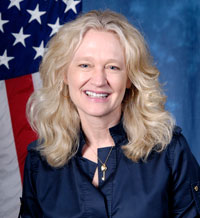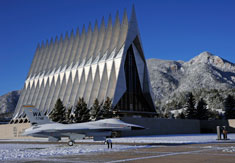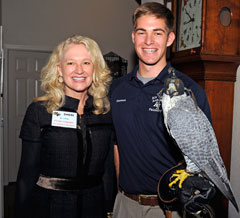UAB Language Professor Teaches Air Force Cadets
By Matt Windsor
 Sheri Spaine Long is serving as a distinguished visiting professor at the U.S. Air Force Academy in Colorado Springs, Colorado.UAB foreign languages professor Sheri Spaine Long, Ph.D., is no stranger to culture shock. For two decades, she has introduced UAB students to the wonders of Europe and Latin America on Study Away excursions. But when she took a post as a distinguished visiting professor at the U.S. Air Force Academy in fall 2011, Long had to learn a whole new way to communicate.
Sheri Spaine Long is serving as a distinguished visiting professor at the U.S. Air Force Academy in Colorado Springs, Colorado.UAB foreign languages professor Sheri Spaine Long, Ph.D., is no stranger to culture shock. For two decades, she has introduced UAB students to the wonders of Europe and Latin America on Study Away excursions. But when she took a post as a distinguished visiting professor at the U.S. Air Force Academy in fall 2011, Long had to learn a whole new way to communicate.
“I’m on my own Study Away program—in the military,” Long says. “I’m still teaching Spanish, just as I was at UAB, but things are very different here.” For one thing, Long, who lives on the vast Air Force base on which the Academy’s campus is located in Colorado Springs, Colorado, has to pass through two checkpoints to get from her house to her classroom. And she knows that each lecture will bring her students to their feet.
“They don’t have to salute me because I’m a civilian,” Long says. “But when I walk in, all of my students stand at attention and say, in Spanish, ‘All present and ready to learn.’ They do that for all their classes. It’s a great way to break with whatever they’ve been doing and reminds them why they’re in the class in the first place.”
Trained to Teach
Long heard about the visiting professorship positions from a colleague. Faculty members invited to the program must have a national reputation in their field of study; Long’s role as editor of the academic journal Hispania and her leadership on the American Council on the Teaching of Foreign Languages and the American Association of Teachers of Spanish and Portuguese made her a perfect fit. She was intrigued by the chance to build new research partnerships—and explore a completely different culture.
 Situated at the base of the Rocky Mountains near the historic Santa Fe Trail, the Air Force Academy campus is "like living in a national park," Long says.“I lived during the Vietnam epic as a young kid, and I had a lot of stereotypes about the military,” Long says. She has been amazed by how much she has enjoyed the experience. “Everyone has been very helpful; the officers and cadets are very team-oriented, and they definitely want to break down barriers between the military and mainstream academics.”
Situated at the base of the Rocky Mountains near the historic Santa Fe Trail, the Air Force Academy campus is "like living in a national park," Long says.“I lived during the Vietnam epic as a young kid, and I had a lot of stereotypes about the military,” Long says. She has been amazed by how much she has enjoyed the experience. “Everyone has been very helpful; the officers and cadets are very team-oriented, and they definitely want to break down barriers between the military and mainstream academics.”
In addition to the visiting professors, the Academy houses “foreign exchange officers—active-duty fighter pilots from Germany, Spain, and elsewhere,” Long says. “They have all been to war, but they are the nicest people you would care to meet. Some of them call me ‘Super Doc’ because I come from the academic world.”
Culture Wars
In her initial semester at the Academy, Long has taught advanced courses in Spanish literature and Latin American culture. She is now developing a research project for the classroom for cadets that combines leadership and language training. “There is a huge emphasis on language and cultural education in the U.S. military right now,” Long says. “I learned the other day that the number-one major at West Point [the U.S. Army’s academy] is foreign languages. They want to groom global leaders who are not only multilingual but who are also culturally prepared to interact with the world.”
One aspect of that preparation is “a very broad exposure to the humanities,” Long adds. “I thought they would only want to focus on speaking skills, but they want these young men and women to have the kind of knowledge that comes from discussing the hard issues.”
For example, her advanced literature class recently analyzed Nobel laureate Pablo Neruda’s poem “Explico algunas cosas” [trans. “I Explain a Few Things,”] a meditation on bombings in the Spanish Civil War that ends with the repeated line, “Come and see the blood in the streets.” Poetry, novels, and other works of literature “allow you to have a series of experiences and then enter a robust discussion about what you would have done in similar circumstances,” says Long.
Common Ground
The cadets in her classes are less involved in popular culture than her UAB students, Long notes. “They don’t have a lot of TV and movie time, so the examples I might use to illustrate a point in class sometimes go over their heads,” she says. “But in my course on Latin America, whenever there’s a piece of war history that comes up, the students will pepper me with lots of extra questions.”
 Although the cadets at the Air Force Academy are soldiers first, they enjoy many college traditions. Long is pictured here with the Air Force athletic teams' falcon mascot and a student handler.Long also says she has found that it takes longer to get to know her students at the Academy. “They are very friendly and engaging, but they are more formal. Also, we’re not allowed to address students by first name in the USAFA Department of Foreign Languages, which is always my practice at UAB.”
Although the cadets at the Air Force Academy are soldiers first, they enjoy many college traditions. Long is pictured here with the Air Force athletic teams' falcon mascot and a student handler.Long also says she has found that it takes longer to get to know her students at the Academy. “They are very friendly and engaging, but they are more formal. Also, we’re not allowed to address students by first name in the USAFA Department of Foreign Languages, which is always my practice at UAB.”
Nevertheless, the cadets and her UAB students share one trait in common: busy schedules. “Both sets of students can get drowsy in class,” Long says. “With UAB students, it may be because they just worked a night shift. With cadets, it’s because they woke up at 4 a.m. to take a training flight before they started academic classes.
“They think that other students aren’t as busy as they are,” Long adds. “And they are very busy—they all have to do a sport, fly, and march every day, along with their classes. But I let them know that UAB students often work just as hard. Many UAB students work 40 hours a week, some of them already have kids, and they’re taking a full courseload.”
Long says she is adapting to the rise-and-shine ethos of military life herself. “I’m waking up at 5:30 now, which is earlier than I do in Birmingham. And I’m working out in the middle of the day with my faculty colleagues. Everyone is so fit here; they just expect you to do it.” On the weekends, Long often explores the Santa Fe Trail, which runs through the Academy’s military installation. “It is so scenic. It’s like living in a national park,” she says.
Long’s husband, John, an ophthalmologist who specializes in oculoplastic and reconstructive surgery in private practice in Birmingham and is an associate clinical professor on faculty at the UAB Department of Ophthalmology, couldn’t make the move with her, but he has visited multiple times. They have hiked the 13-mile roundtrip to the top of Pikes Peak—a local “rite of passage,” Long says. And she has found one simple way to combat homesickness: She starts each day by listening to Birmingham’s WBHM radio on her computer.
When she returns to Alabama from her Colorado sojourn in fall 2013, Long plans to implement new teaching techniques and develop new courses that will “infuse the foreign language curriculum with leadership training,” she says. “There are many things that I will bring back to UAB.”
Some aspects of military life would probably be lost in translation, however. “I like the tradition of starting each class by reciting, ‘We are ready to learn,’” Long says. “But I don’t know if I’ll be able to convince my UAB students to stand at attention when I walk in the room.”